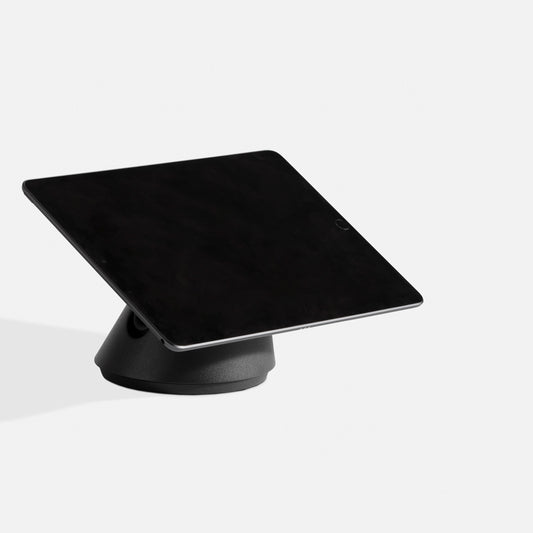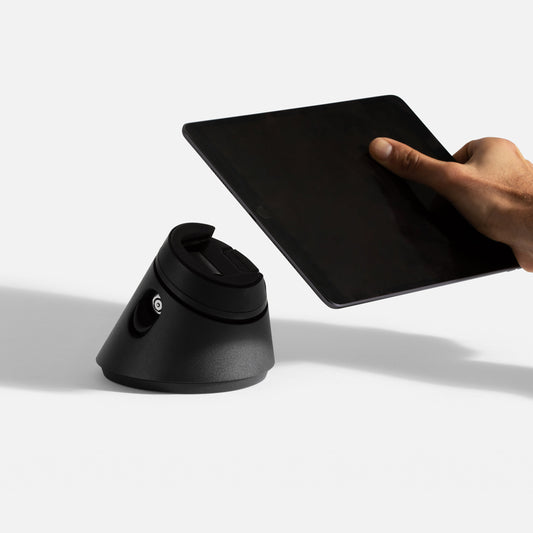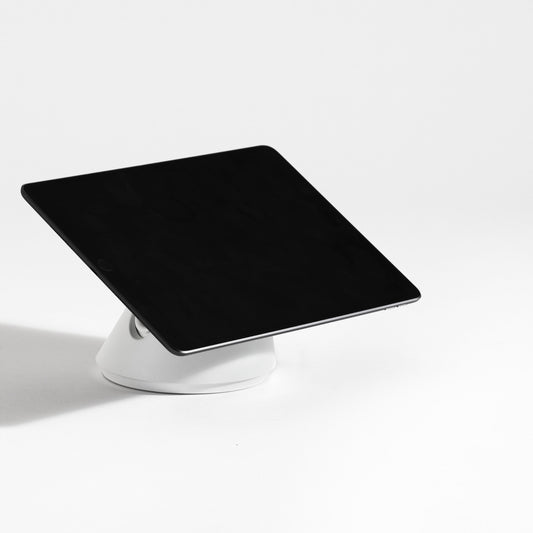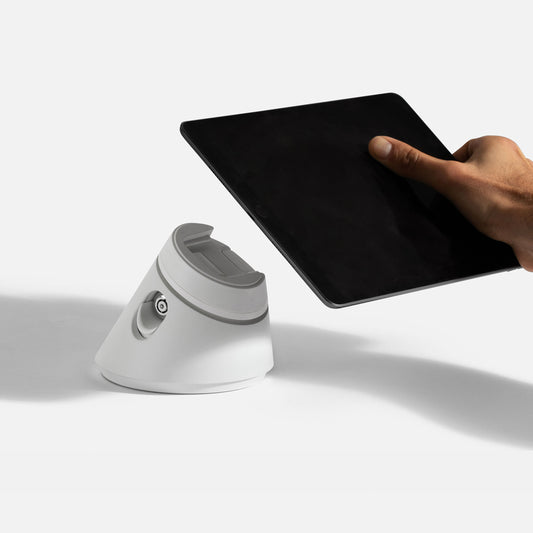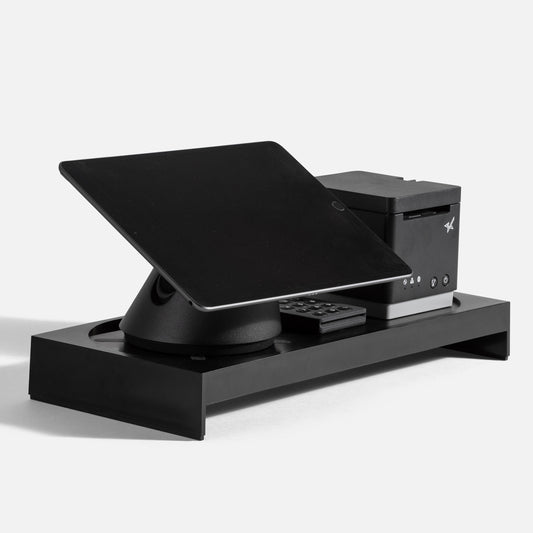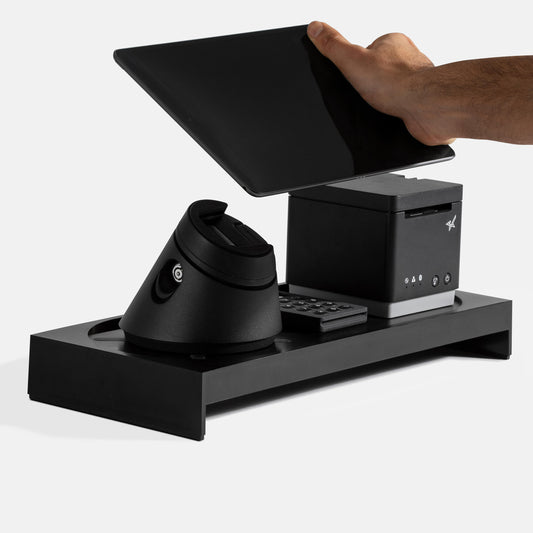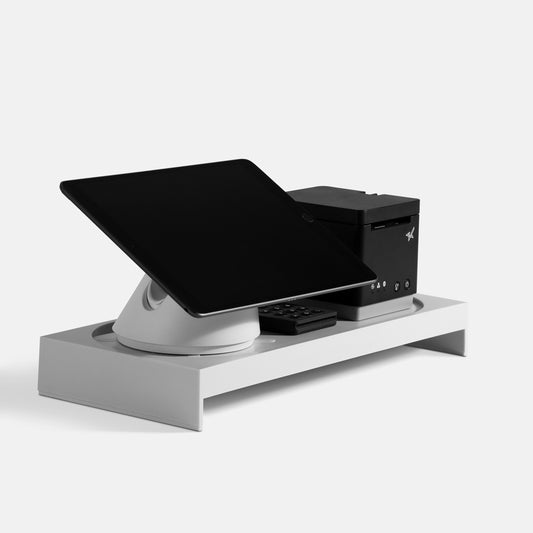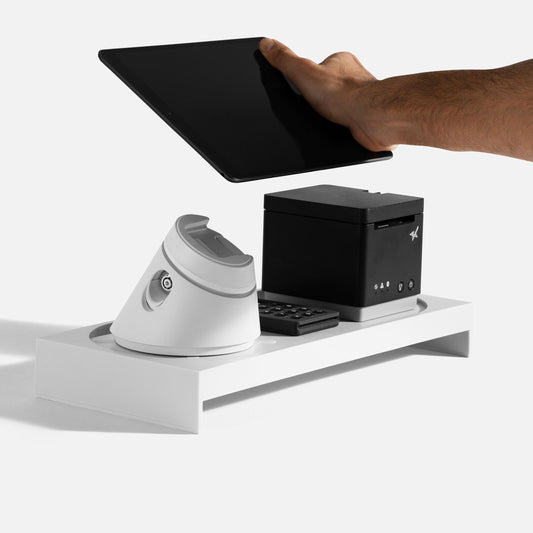In space, nobody can hear you scream.
Nobody can see your screen either, especially if it’s floating around in microgravity without a tablet stand to hold it in place.
Although we’re quite a down-to-earth bunch here at Bouncepad, occasionally we like to take a flight of fantasy and ponder some “out of this world” ideas. And let’s face it, with Elon Musk planning to launch 148 rockets into space this year, space travel might become feasible for many of us in the not-too-distant future.
That’s why we decided to speculate about how we would design tablet stands for the International Space Station. Intergalactic thinking can sometimes spark new ideas for industrial design, so let’s see what we can come up with!
The Importance of Ergonomics in Space
Let’s face it – space is no ordinary workplace. You can easily get neck and eye-strain on planet earth, but when you’re floating around in microgravity, even simple tasks like using a tablet or mobile device becomes trickier.
Here are a few reasons why ergonomics are important in space:
- Avoid Injury: ISS astronauts spend a lot of time working in cramped environments and need to be careful to avoid injuries and accidents. Good posture is key. If their tablet isn’t positioned well, they might end up twisting and turning to see it. Tablet stands in space need to be super-adaptable and secure, supporting various angles and orientations
- Efficiency: Tasks need to be done quickly and efficiently as time and resources are limited.
- Physiological Adaptation: Microgravity causes changes in vision, spatial interpretation, and muscle strength. Ergonomic design helps to reduce the negative impact of these bodily changes.
- Cognitive Performance: Good ergonomic design helps to reduce mental load and fatigue as people don’t need to worry about how to position their devices.
Now we know how important ergonomics are in space, let’s take a look at how this might direct the industrial design of tablet stands.
Design Considerations for Space Tablet Stands
1. Flexibility
On the ISS, everything needs to serve multiple functions and fit easily into different settings. Therefore, a tablet stand should be designed to attach to various surfaces such as walls, tables, control panels, and maybe even the curved walls of space station modules. An iPad stand with a click-in-place, velcro or magnetic attachment could work well to give astronauts the flexibility they need.
2. Materials
When you’re building a tablet stand for the ISS, it needs to be able to withstand the rigors of space travel and frequent use. A tablet stand like the Bouncepad Click is made from die-cast aluminum and glass-filled plastic, so it is robust and strong.
3. Ease of Use
Anything that’s designed and built for space, must be easy to use. The last thing you want when you’re floating around in the ISS is to be fiddling around trying to connect your device to different ports. The handy, quick release click mechanism of the Bouncepad Click could be ideal for mounting on different surfaces on the ISS. It’s simple enough that you could even attach or detach it while wearing thick gloves.
4. Health and Safety
Of course, health and safety is even more important in space than it is on earth. On the ISS, every piece of equipment, including tablet stands, must be designed with stringent safety standards in mind. Loose objects in a microgravity environment can be a serious hazard if they collide with other equipment or the astronauts themselves. At Bouncepad, we make iPad stands to the highest build quality possible, meeting all industry standards and best practices.
Potential Innovations
Considering all the design requirements, we think that with a few modifications, the Bouncepad Click would be the ideal tablet stand for the ISS. The stand could be mounted on various surfaces throughout the space station for easy use.
Okay, now it’s time to let our imagination fly and think about how we could integrate some cutting edge tech with our tablet stands to make things even easier while orbiting the earth.
Integrated AI
Imagine a stand that not only holds your tablet securely but also adjusts its position and angle based on how you're interacting with it. This would help a lot in maintaining good posture and avoiding strain.
Advanced Materials
Material engineering is advancing quickly, especially in the field of self-healing materials. There are two main types:
- Extrinsic self-healing materials have healing agents built into them. Imagine if a material had a tiny capsule of glue inside that would break open and repair a crack if it ever formed. These materials might need heat or light to start the process.
- Intrinsic self-healing materials can mend themselves without needing any external agent or trigger as they are designed to self-heal on a molecular level.
Graphene is another exciting material that’s currently in development. It’s believed to be one of the strongest and most flexible materials known, yet it’s incredibly lightweight, making it ideal for space equipment.
Conclusion
Even though we’ve been talking about tablet stands for use in space, the design considerations and potential innovative materials and tech are applicable on planet earth too.
We can learn a lot from the ergonomic challenges of space-ready design, as well as the need for adaptability and toughness. Thinking about designing iPad stands for the ISS has given us some insights into how we can improve design for other challenging settings, such as medical facilities and other dynamic workplaces.
If you’d like to find out more about how we design and build our tablet stands, then check out The Making of The Bouncepad Wing.


